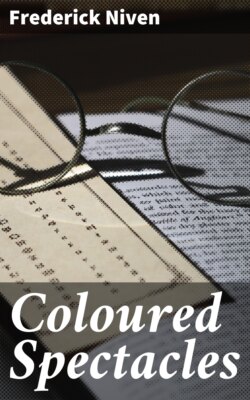Читать книгу Coloured Spectacles - Frederick Niven - Страница 7
На сайте Литреса книга снята с продажи.
IV
ОглавлениеTable of Contents
Though electric tram-cars took the place of horse-drawn ones in those distant days (one of the first on its trial trip, I remember, left the rails and crashed into a florist's on the corner of West Nile Street near which MacLehoses' library used to be, with a protest of shattering glass), never have I returned on visits to my old city without missing the group of trace-boys and trace-horses clustering at the foot of the brae of Renfield Street. How adroitly did they slip alongside the cars! There was the click of a chain-end on a hook, the boy swung on to his perch, the trace-horse lunged into the collar to help in the drag uphill to Sauchiehall Street.
Those tea-shops of Miss Cranston's that Rennie Mackintosh was beautifying were part of that era. There was one in Ingram Street close to the place of business where I was ostensibly busy. In its basement smoking-room I used to filch time from my employers—who deserved better of me—making secret sketches of the customers or trying, and failing, to write verses.
One day—it was the week that the darkening news of the death of Stevenson was in all the papers—I sat alone there during the city's busiest and the tea-shop's slackest hour, in an atmosphere of remoteness at the very heart of the hurly-burly. I was looking at a reproduction of William Strang's etching of him in one of the magazines when the waiter brought me my coffee and thrust the ash-tray closer. He noted the portrait and informed me that he had "met that gentleman."
Did he once see Stevenson plain? Why, certainly—when hall-porter in a hotel at Pitlochry at which R.L.S. had stayed a while. He gave me his personal recollections, a little different from those of Gosse, but not without interest. His memories of Stevenson (an early riser, it appeared) were associated with matutinal shaking of mats at the doorway before the guests were stirring. Leaning on his broom he had whiffed a cigarette and passed the time of morning with him while dew was still on the lawns.
A bell buzzes and that waiter hurries away and leaves me thinking, musing, spooning up the brown sugar in the blue bowl and absently watching it sag and cohere. There is a ceaseless drumming outside along the pavement on a level with the ceiling, the drumming of the heels of those who are forging ahead—and I dash up the stairs at last, away from dreams to business.
Where, earlier, I had gone with chums of schooldays guddling for trout in the little burns of the Mearns Moors, I was then going solitary, sketching-block, notebook, and some book I was reading, for company, putting my pockets out of shape. Sometimes I went by the Kilmarnock Road past the Giffnock quarries where we used to look for fossils and adventure in the tunnels, sometimes by Waterfoot and Eaglesham.
The name of Waterfoot still flicks a wagtail over blue-grey boulders for me, and that of Eaglesham brings crowding memories. It was there that one of our heroes, James Christie, made his sketches for Vanity Fair that hangs in the Corporation Galleries. The proprietor of a travelling booth allowed him to stand inside looking through a knot-hole, sketching. There was a rumour in the School of Art that when Christie had used all his sketch-blocks he made drawings on the wall. Did the owner, we wondered, know their value? Would he cut out the boards on which they had been made and preserve them? Might we perhaps buy one or two from him? Vain inquiry, that, for some of us—whatever the price the showman might ask for a sketch. The wealth of most of us was not in coin.
To the hill of Ballygeoch, that John Buchan put into one of his early novels, I tramped often in those days. In Fair Week, when the furnaces were out in Glasgow for their annual redding and the smoke-pall of the city passed away, half Scotland was revealed thence, slumbering in summer sun. Turning about and about one looked into the grey-green storied Borders, into the grim, romantic purple Highlands, away over Ayrshire with its pattern of fields to the Firth and the ragged ridge of Arran, and might even pick out the steamer on its way between Ardrossan and that delectable island. For the sake of Ballygeoch I tried to read Pollok's Course of Time, he having lived in a farmhouse nearby. The world, it seemed, went very well then; yet no doubt there was much that was bitter and difficult in those days as in these, but memory winnows.
